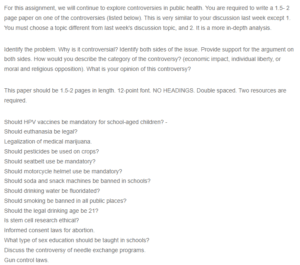Controversies in Public Health – Informed Consent Laws for Abortion
Problem
The issue of informed consent laws for abortion involves requiring women seeking an abortion to receive information and counseling about the procedure’s nature, risks, and alternatives before they can undergo it (Venkatraman, 2020). This requirement is controversial because it potentially limits a woman’s right to make autonomous decisions about her body and the fetus’s future.
Controversy
The controversy lies in whether the informed consent laws are necessary to protect women’s health and ensure that they make informed decisions or are an attempt to restrict access to abortion by creating barriers and unnecessary requirements.
Both Sides of the Issue
Proponents of informed consent laws argue that they protect women’s health by providing them with complete information about the procedure. They claim that women should be aware of the potential risks and alternatives to abortion before making a decision that could have long-term effects on their health and well-being (Parker, 2020). Supporters of informed consent laws also argue that they promote informed decision-making and decrease the likelihood of regret or emotional distress after the procedure.
Opponents of informed consent laws claim that they are a thinly veiled attempt to restrict access to abortion by creating unnecessary barriers. They argue that women seeking abortion are already well-informed and that mandatory counseling and waiting periods can create undue burdens, especially for low-income women who may have to take time off work or travel long distances to access services (Undurraga & Sadler, 2019). Opponents of informed consent laws also argue that these laws violate a woman’s right to make autonomous decisions about her own body and could force her to carry a pregnancy to term against her will.
Category of Controversy
This controversy falls under individual liberty and moral and religious opposition. Informed consent laws raise questions about a woman’s right to make autonomous decisions about her own body and the government’s role in regulating access to abortion (Venkatraman, 2020). The debate also involves moral and religious opposition to abortion, as some individuals and organizations believe the procedure is morally wrong and should be restricted.
Opinion
In my opinion, informed consent laws are unnecessary and potentially harmful to women seeking an abortion. While it is vital to provide accurate and complete information to women before any medical procedure, including abortion, mandating counseling and waiting periods can create unnecessary barriers and infringe on a woman’s right to make autonomous decisions about her own body (Parker, 2020). Additionally, some of the information provided during counseling sessions can be biased or inaccurate, which could further mislead and confuse women seeking an abortion.
Moreover, informed consent laws can create logistical and financial burdens for women seeking an abortion, particularly low-income women with limited access to transportation or childcare (Parker, 2020). These barriers could ultimately delay or prevent women from receiving necessary medical care, putting their health and well-being at risk.
While some individuals and organizations have moral and religious opposition to abortion, I believe that a woman’s right to make decisions about her own body should be prioritized. Informed consent laws may be well-intentioned, but they can ultimately restrict access to safe and legal abortion and compromise women’s health and well-being.
Conclusion
In conclusion, the controversy surrounding informed consent laws for abortion highlights the ongoing debate about a woman’s right to make autonomous decisions about her own body and the government’s role in regulating access to abortion (Venkatraman, 2020). While proponents of informed consent laws argue that they protect women’s health and promote informed decision-making, opponents claim that they are a thinly veiled attempt to restrict access to abortion. As a society, we must prioritize women’s autonomy and ensure they have access to safe and legal reproductive healthcare without unnecessary barriers or restrictions.
References
Parker, W. J. (2020). The moral imperative of reproductive rights, health, and justice. Best Practice & Research Clinical Obstetrics & Gynaecology, 62, 3-10. https://doi.org/10.1016/j.bpobgyn.2019.07.006
Undurraga, V., & Sadler, M. (2019). The misrepresentation of conscientious objection as a new strategy of resistance to abortion decriminalization. Sexual and Reproductive Health Matters, 27(2), 17-19. https://doi.org/10.1080/26410397.2019.1610280
Venkatraman, R. (2020). Informed Consent Laws for Abortion: What Do Women Have a” Right to Know?”.
ORDER A PLAGIARISM-FREE PAPER HERE
We’ll write everything from scratch
Question

Controversies in Public Health
For this assignment, we will continue to explore controversies in public health. You are required to write a 1.5- 2 page paper on one of the controversies (listed below). This is very similar to your discussion last week except for 1. You must choose a topic different from last week’s discussion topic, and 2. It is a more in-depth analysis.
Identify the problem. Why is it controversial? Identify both sides of the issue. Provide support for the argument on both sides. How would you describe the category of the controversy? (economic impact, individual liberty, or moral and religious opposition). What is your opinion of this controversy?
This paper should be 1.5-2 pages in length. 12-point font. NO HEADINGS. Double spaced. Two resources are required.
Should HPV vaccines be mandatory for school-aged children? –
Should euthanasia be legal?
Legalization of medical marijuana.
Should pesticides be used on crops?
Should seatbelt use be mandatory?
Should motorcycle helmet use be mandatory?
Should soda and snack machines be banned in schools?
Should drinking water be fluoridated?
Should smoking be banned in all public places?
Should the legal drinking age be 21?
Is stem cell research ethical?
Informed consent laws for abortion.
What type of sex education should be taught in schools?
Discuss the controversy of needle exchange programs.
Gun control laws.

